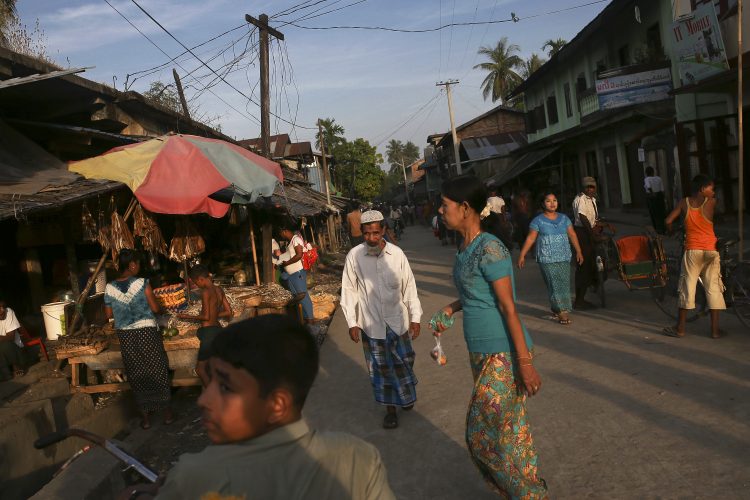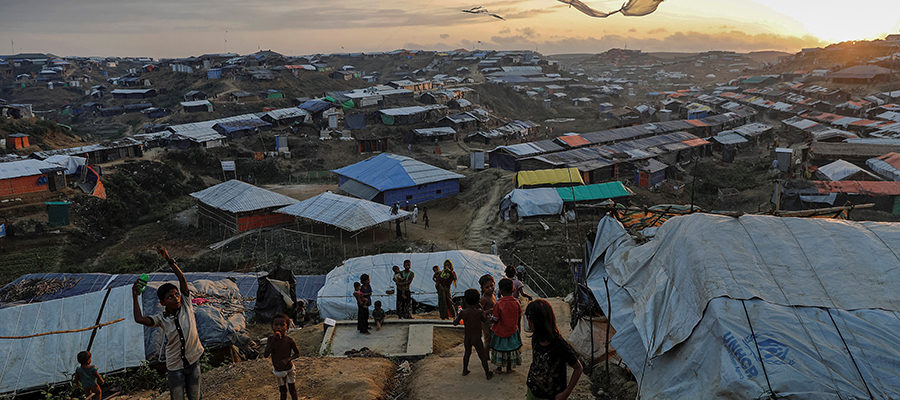YANGON — More than half of the 7,000-plus Muslim Rohingya who have applied for citizenship in Rakhine State over the past three years have now been accepted following a wave of approvals in just the last few months, according to the Ministry of Labor, Population and Immigration.
U Shein Win, deputy director general of the ministry’s National Registration and Citizenship Department, said most of them failed to qualify for full citizenship because they lacked the necessary family records going back seven decades.
In any case, the recent wave of citizenship cards has been raising both hopes and old grievances across the strife-torn region. It has drawn a mixed reaction among Rohingya in Maungdaw Township and the more than 700,000 who have fled to Bangladesh since late 2017 to escape a military crackdown in northern Rakhine.
Myanmar and Bangladesh agreed in early 2018 to repatriate the refugees, but the process has yet to begin in earnest. Only a few dozen have returned to Myanmar to date, mostly outside of official channels.
Recently, authorities in Rakhine have issued more than 100 green cards granting partial citizenship to Rohingya who stayed in Maungdaw as an incentive to entice more of the refugees back.
According to Maungdaw residents, more than 400 applicants are still awaiting decisions on what sort of citizenship they will receive — if any.
Myanmar’s Citizenship Law was enacted in 1982 under the Ne Win regime, creating three categories of citizenship with varying privileges: full, associate and naturalized. The accompanying cards are colored pink, blue and green, respectively. The laws stipulates that anyone whose ancestors arrived Myanmar before Jan. 4, 1948, the day Myanmar gained independence from Britain, is eligible for one of the three.
All applications are vetted in Naypyitaw by the Central Body, made up of top officials from several government ministries.

Thousands of cards issued
U Shein Win said the “program” was initiated in 2016, a few months after the national elections that swept the National League for Democracy to power.
He said the majority of the applicants were those with National Verification Cards (NVCs), which grant Rohingya residence in Myanmar while they apply for citizenship.
The NVCs were thought up by the previous administration, headed by the military-backed Union Solidarity and Development Party, to replace the so-called white cards. The white cards had allowed holders to vote in the 2010 general elections but were revoked after the communal riots that swept across the country two years later, disenfranchising many Rohingya in the process.
U Shein Win said the government had issued 14,000 NVCs in Rakhine, and at least half the holders have applied for citizenship. He said the government handed out citizenship cards to those applicants in two groups earlier this year and had only one group left to vet.
“Most of the applications have been approved; I just don’t know the specific number…. I think there is only one batch to be completed.” he said.
U Shein Win said most of them have received green and blue cards. A few pink cards went to those with the most complete family records. “Pink cards appear to be the fewest,” he said.
More rights
Some Rohingya applicants say the Central Body recently approved 74 green cards.
Abdul Rashid (name changed for his safety), from Maungdaw, said his family was among the lucky few granted pink cards because they had records going back seven generations.
He said many applicants thought they would get full citizenship, but added that most could not produce the necessary family documents dating back to 1948 or beyond and received green or blue cards instead. He said some of those granted green cards were dissatisfied and have appealed the decision, while others have refused to even take them.
Amir Hamza (name changed) is still awaiting a decision on his application.
He said the cards — whether pink, blue or green — label them as ethnic Bengali rather than Rohingya, which they consider themselves, but have been accepted regardless by most as a ticket to a better life. Because even as naturalized citizens, he said, they can move freely, own property, access education, vote and get passports.
“Although we prefer Rohingya over Bengali, a green or pink card is a necessity, so we exchanged our [ethnic] status to have a practical life,” Amir Hamza said.
U Shein Win, the immigration official, confirmed that the new cards labeled the holders Bengali, reflecting the government’s position that they are the descendants of Bangladeshi laborers brought to Myanmar by the British before independence.

A tough choice
It remains unclear how many NVC holders have submitted applications nationwide as of February.
According to the President’s Office, the Immigration Department issued nearly 760,000 white cards and about 470,000 have been surrendered as of December 2016.
Since then, the department has distributed about 6,000 NVCs to those who surrendered their white cards.
Amir Hamza, who is on good terms with some local officials, said that about 150 green cards were handed out in Rakhine as of February.
He said that so long as Rohingya insisted on being identified as such, they would never gain citizenship.
“We lose our identity, but we have greater opportunities. I think my decision [to apply] was not wrong,” he said.
Naturalized and associate citizenship is open to anyone who entered, or whose parents entered, Myanmar after 1948, or who has a Foreign Registration Card. However, those citizens are not allowed to become diplomats, members of parliament or run for president or hold other senior government positions.
Abdul Rashid and Amir Hamza said some Rohingya refugees in Bangladesh also want to apply for the citizenship cards but are afraid they may be targeted by the Arakan Rohingya Salvation Army. The militant group launched the attacks on police posts in Rakhine State that triggered the military crackdown in 2017, and some of its members are reported to be hiding in the camps among the refugees.
Not good enough
Al Haj U Aye Lwin, a former member of the now-defunct Advisory Commission on Rakhine State, said issuing green cards to Rohingya in Maungdaw with the requisite family records was not good enough.
As a commission member, he visited the refugee camps in Bangladesh several times and learned that many of the refugees had National Registration Cards (NRCs), which the Myanmar government started issued in 1951 to every citizen but later demanded back. Many Muslims, particularly those in Rakhine State, did not turn them in.
After a popular nationwide uprising in 1988, the government began issuing Muslims with the white cards. U Aye Lwin said many white card holders therefore likely had NRCs before. He urged authorities to consider that before granting applicants anything less than full citizenship.
“If the recipients accept green cards or associate citizenship, we have nothing to say. But once they accept the green card, it means they are being downgraded from full citizenship,” said U Aye Lwin, a member of the Myanmar Interfaith Dialogue Group.
He noted, however, that the children of those getting green cards now would eventually be able to apply for full citizenship themselves.
Given the ongoing violence and persecution in Maungdaw, Amir Hamza said he may move to Yangon whatever color card he gets in hopes of starting a new life.
“Once we own that card, we can travel freely across the country,” he said.
And given how many times different identity cards have been issued to Rohingya in the past only to be revoked later, many remain wary of the latest effort.
Asked about those concerns, U Shein Win laughed.
“That will never happen because this program is being carried out by the state,” he said. “Don’t worry.”

















